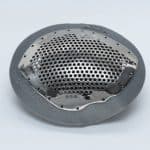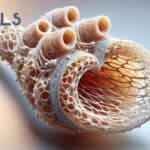
An experienced Chartered Mechanical Engineer, Paul Marshall is an engineering consultant specializing in Life Sciences, and co-founder and CEO of Rapid Fluidics. His work focuses on the design and rapid prototyping of microfluidic systems but also covers a wide range of other projects from medical device design to technical reviews of water, sanitation, and health projects for the Bill and Melinda Gates Foundation. Paul will be speaking at the upcoming Microfluidics event.
When was the first encounter you had with 3D printing? What was that experience like? What were you thinking at that moment?
Paul: Amazingly, it was only when we started looking into alternative ways to produce prototype microfluidic parts quickly. The realization that we could go through iterative development cycles quickly was mind-blowing!

What inspired you to start your journey?
Paul: I made the decision several years ago to move my mechanical engineering career into the life-science sector – after 15 years of designing, analysing and building machinery, I wanted to have a more positive impact on society. This brought up the opportunity to take the 3D printing process and evolve it to suit our needs.

Who inspired you the most along this journey in 3D printing?
Paul: He’ll hate me for saying this, but my colleague and business partner, Babis Tzivelekis whose knowledge and understanding of the technology is only surpassed by his enthusiasm. I’ll also mention Kenny Dalgarno from Newcastle University. Without his support, I wouldn’t have had the confidence to build the business.
What motivates you the most for your .work?
Paul: The sheer enormous potential! When you look at both the growing demand for microfluidics, and the growth of the 3d-printing industry, I find the fact that we’ve combined them and have the ability to provide that service for our customers so they can get their products to market quicker, and ultimately help their end-customers to help patients is just thrilling.

What is/are the biggest obstacle(s) in your line of work? If you have conquered them, what were your solutions?
Paul: Other than setting a new business in the midst of covid lock-down, the biggest challenge has probably been convincing people that out-sourced 3D-printed microfluidics makes sense. There is the attitude that “its just a 3D printer, I’ll do it myself”. But because we’ve got over a large number of technical challenges, and have the resources and experience to develop new solutions rapidly it soon becomes apparent at all levels in our customer’s business that we can help them be more efficient.

What do you think is (are) the biggest challenge(s) in 3D Printing/bio-printing? What do you think the potential solution(s) is (are)?
Paul: Probably the available materials. Yes, you can get “PC-like” and “ABS-like” resins, but until we can get materials that actually are what they’re supposed to be, we will be limited. The other aspect to consider is environmental sustainability. Ultimately, we’re creating single-use plastic parts. This is partially driven by our customer’s need for biocompatibility and contamination prevention, but I’d love to see more environmentally friendly materials being developed. Or, vice versa, different printing processes are developed for better materials.

If you are granted three wishes by a higher being, what would they be?
Paul: I’ve always said we should put all our resources into developing a time machine first, then we’d have the time to develop everything else! So, I’d have to ask for the ability to stop time so we can have a chance of a breather and produce parts even quicker.
A global single market would be handy. I’ve had a lot of help from the UK Dept of International Trade, but overcoming export rules and regulations is a major challenge. And let’s not talk about the effect of Brexit.
Lastly, a calendar to make sure that all of the trade shows and conferences I’d like to go to don’t clash!

What advice would you give to a smart driven college student in the “real world”? What bad advices you heard should they ignore?
Paul: Entrepreneurship is fantastic, but follow the mantra “know your market”. Get a few year’s industry experience, work in a few companies, get a customer-facing role, and always be looking for an opportunity to be unique.
Bad advice? “Fake it until you make it”. No, no. NO! The truth will be out.
Relevant Links:
Guide: 3D Printing For Cancer Care



 Sep 01, 2022
Sep 01, 2022 






Comments